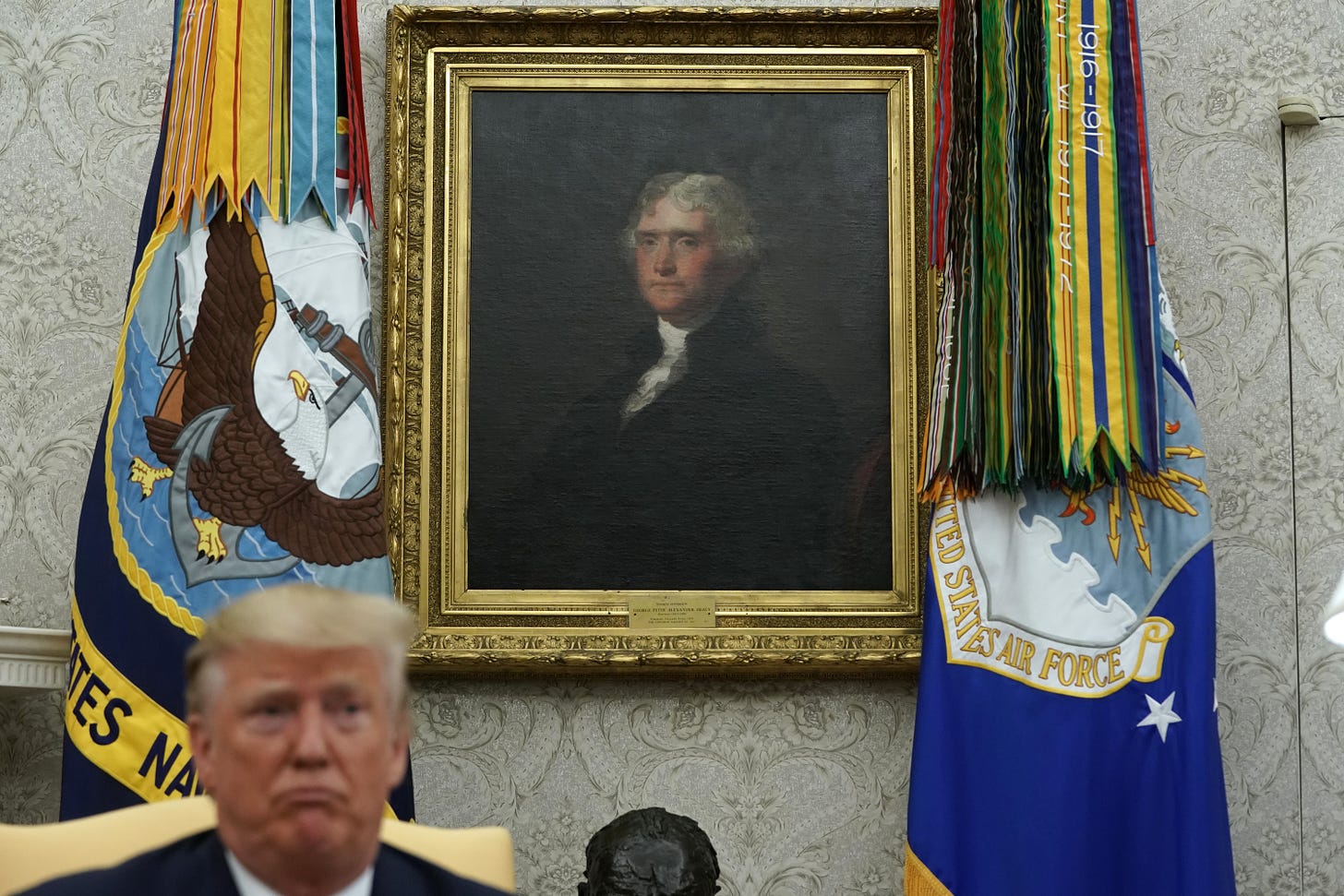The Declaration of Independence's warning for Trump
"The king violated their rights time and time again, and he basically 'un-kinged' himself."

🦅🗽🦅 With corporate outlets obeying in advance, supporting independent political media is more important right now than ever. Public Notice is possible thanks to paid subscribers. If you aren’t one already, please click the button below and become one to support our work. 🦅🗽🦅
Donald Trump is having ICE agents grab people off the streets and sending them to a gulag in El Salvador with a reputation for brutality and never releasing anyone. He’s starting trade wars with the whole world and hobbling the American economy in the process. He’s causing chaos, stifling free speech, and violating the Constitution in countless ways.
As this has been happening, several journalists and scholars have noted that the things the Founding Founders were upset about when they wrote the Declaration of Independence ring true today. Consider just a few of the grievances the Declaration lodges against the King of Great Britain:
Dr. Joanne Freeman, a professor of history at Yale University, points out that underpinning the Declaration is a concern about due process that’s relevant today as Trump tries to become a tyrant and rule by decree.
”All of these things that sound like cliches are actually really important. If you’re walking down the street and someone grabs you and says ‘You’re illegal’ and wants to send you to El Salvador, you have the right to a fair trial,” Freeman told Public Notice.
“That’s what’s so alarming about the implications of the things happening today, when the president or government is picking someone up on the street, sending them to a prison in El Salvador, and not bothering to ask if they’re guilty or innocent. Just shove them over there and abandon them. That could happen to anyone. It’s off the charts authoritarian.”

Freeman went on to point out that the Declaration also provides an important lesson about the legitimacy of government and what can happen in its absence.
“Colonists were thinking about the broader implications of rights being denied, and the fact they recognized that the leader of their country was where the buck stopped, and he didn’t stop the buck — that had major implications,” she said. “That might be something people can reflect on these days when thinking about the Declaration of Independence.”
A transcript of the full conversation between Freeman and Public Notice contributor Thor Benson, lightly edited for length and clarity, follows.
Thor Benson
A number of folks have pointed out lately that parts of the Declaration of Independence speak to Trump’s various abuses of power. Are there some similarities between what people were upset about during the time of the revolution and what they’re upset about today?
Joanne Freeman
There are. If you put the Declaration in historical context, by the time you get to July 1776 and they’re actually ready to declare independence, by that point they’ve been protesting a huge stream of policies and activities and legislation coming down from the king and parliament. People tend to look at the Declaration of Independence and focus on the preamble — “When in the course of human events…” — but actually the big list of things that the king had done to his people is at the center of it.
The core of the document is saying the king is a tyrant. The argument of the Declaration is that the king was depriving the colonists of their rights. Some of those rights perhaps haven’t resonated with Americans before now, like depriving them of trials or making them have trials far away from home. A lot of the things listed there are things they saw as denying their rights to control their property, to a fair trial.
They were declaring independence from what they considered to be tyrannical rule. The last part of the British Empire that Americans broke away from was actually the king, which is why the Declaration is so powerful. The king was like the father. People felt intense loyalty. In the years leading up to the Declaration, Americans were gradually separating themselves from parliament, which they thought was doing lots of bad things, but they kept looking to the king to make things better.
They thought the king would be sound and think about his subjects. He would not keep enforcing these bad policies. When one thing after another proved that was not going to be the case, and that the king was indeed a tyrant, that was the final break. Ultimately, the way in which the Declaration of Independence echoes events now is it’s a complaint against a ruler who is violating rights. It’s seen as bigger than the colonies.
The Declaration has to do with fundamental rights being denied. The colonies didn’t just see this as a little policy discussion. They understood the broader implications of what they were saying. The king violated their rights time and time again, and he basically “un-kinged” himself.
Thor Benson
Everyone’s talking this week about Trump’s illegal deportation of Abrego Garcia to a gulag in El Salvador. In the Declaration, it decries “transporting us beyond seas to be tried for pretended offenses.” What’s that about?
Joanne Freeman






